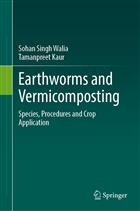Earthworms and Vermicomposting: Species, Procedures and Crop Application
- Publisher : Springer
- Illustrations : 23 col illus, 1 b/w illus
Our customers have not yet submitted a review for this title - click here to be the first to write a review
Description:
This book explains the lifecycle of earthworms, biological features, multiplication of worms, species of earthworms that are suitable for vermicomposting, different sources of vermicompost, nutrient recovery and different procedures for making of vermicompost and importance of application of vermicompost in cereal, fruit and vegetable crops.
The tremendous increase in population, urbanization, industrialization and agricultural production results in accumulation quantities of solid wastes. This has created serious problem in the environment. In order to dispose this waste safely it should be converted effectively. This is achieved by bio-composting and vermicomposting of farm, urban and agro-industrial waste. It is being increasing realized that composting is an environment friendly process, convert wide variety of wastes into valuable agricultural inputs. Compost is excellent source of humus and plant nutrients, on application of which improve soil biophysical properties and organic matter status of the soil. India generates about 350 million tonnes of agricultural waste every year. Agricultural wastes include crop residues, weeds, leaf litter, sawdust, forest waste, and livestock waste. Under appropriate conditions, worms eat agricultural waste and reduce the volume by 40 to 60%. Vermicompost produced by the activity of earthworms is rich in macro and micro-nutrients, vitamins, growth hormones, enzymes such as proteases, amylases, lipase, cellulase and chitinase and immobilized microflora.
This book will assist farmers, students and scholars to guide them about lifecycle of earthworms, biological features, multiplication of worms, species of earthworms that are suitable for vermicomposting and different procedures for making of vermicompost. This book will also benefit students of agriculture at graduate and post graduate level as students have a designated course on vermicomposting.
You may also like...
Freshwater Leeches of Britain and Ireland: Keys to the Hirudinea and a Review
Elliott, J.M.; Dobson, M.
Price £27.00
Fauna Iberica 47: Annelida Polychaeta 6
Diego, C.; Lopez, E.; San Martin, G.; Parapar, J.
Price £48.50










